-Africa’s conservation challenges are daunting: on the surface it would seem that time is running short for African wildlife.
- One Ghanian entrepreneur sees conservation as one of the great opportunities for Africa, though: Fred Swaniker, the Founder and CEO of the African Leadership Group, has won accolades for his efforts to transform higher education in Africa.
- One of his latest ventures is African Leadership University’s School of Wildlife Conservation, which aims to help Africans use their knowledge, experience, and big ideas to “own and drive” the conservation agenda in Africa.
- Ahead of ALU’s Business of Conservation Conference taking place September 8-9 in Kigali, Rwanda, Swaniker spoke with Mongabay about equipping conservation leaders with business, managerial, and leadership skills “to transform a generations-old social cause into a next-generation high-growth market.”
Africa’s conservation challenges are daunting. The continent faces rapid human population growth, expanding agriculture and infrastructure, and globalized demand for its natural resources, including its forests, oceans, and wildlife. On top of that, Africa is expected to be particularly affected by climate change, which could produce more extreme weather events, exacerbate conflict, and drive large-scale human migration.
On the surface it would seem that time is running short for African wildlife, but one Ghanian entrepreneur sees conservation as one of the great opportunities for Africa.
“We need to challenge the idea that Africa’s extraordinary biodiversity and wildlife is a diminishing resource that needs to be protected and reframe conservation as a growth sector,” said Fred Swaniker, the Founder and CEO of the African Leadership Group who has won accolades from the likes of Bill Gates, Time Magazine, and the World Economic Forum for his efforts to transform higher education in Africa.
Conservation, Swaniker told Mongabay, has three critical characteristics of a growth sector, including the enabling conditions needed to recast Africa’s wildlife as one of the continent’s greatest assets, a magnetic appeal to attract top talent, and the potential to yield financial returns for investors and local communities.
For these reasons, Swaniker has made conservation one of the central priorities of his efforts to develop and enable the next generation of African leaders through African Leadership University (ALU), which currently has two campuses and aims to have 25 across Africa by 2025. ALU’s School of Wildlife Conservation (SOWC) specifically aims to help Africans use their knowledge, experience, and big ideas to “own and drive” the conservation agenda in Africa.
“Today, most African communities do not see wildlife as an asset that they ‘own’; and strong African voices are largely excluded from the conservation agenda,” states the SOWC’s web site. “We believe that unless African communities feel ownership of wildlife and the natural environment, they will have little incentive to conserve it. Given the continent’s demographics (the average age of an African is 19.5), we need to bring in younger, talented Africans and more women into the room. We need to change the narrative and engender new champions for conservation.”
“The ALU School of Wildlife Conservation is the first of its kind on the continent, dedicated to growing the next generation of world class conservation leaders in Africa,” he continued. “The continent needs home-grown African leaders to spearhead new and innovative approaches in the business of conservation.”
Ahead of ALU’s Business of Conservation Conference taking place September 8-9 in Kigali, Rwanda, Swaniker spoke with Mongabay about equipping conservation leaders with business, managerial, and leadership skills “to transform a generations-old social cause into a next-generation high-growth market.”

Fred Swaniker. Photo courtesy of ALU
AN INTERVIEW WITH FRED SWANIKER
Mongabay: What prompted your interest in nature or the environment?
Fred Swaniker: Growing up I lived in several African countries, including the wildlife hotspots of Botswana and Zimbabwe. When I went to college in the United States, I was frequently asked if I had ever seen a lion or elephant? Even though I grew up next to some of Africa’s most majestic wildlife reserves, I had only seen these animals at the zoo — my parents, like the vast majority of Africans, couldn’t afford to take our family on safari.
It wasn’t until I returned to Africa as a consultant for McKinsey that I saw these animals in the wild for the first time. The firm was advising a consortium of safari lodges, one of which I had the opportunity to visit for free. Seeing these remarkable animals up close and in their natural habitat was a beautiful and breathtaking experience. But I was the only African on that safari. It made me sad to think that these national treasures were there for the benefit of tourists and operators — not for my fellow Africans.
I wanted to change this.
If Africans didn’t have an opportunity to see these remarkable animals and their habitats, I worried that our wildlife would eventually die. We need to give people a reason to care. And the best way to give people a stake in Africa’s wildlife is to expose them to it. That starts with recognizing that there is no greater, more distinctive asset in the world than our continent’s natural beauty and wildlife. There is simply nothing else like it anywhere in the world and I wasn’t going to let it slip away forever.
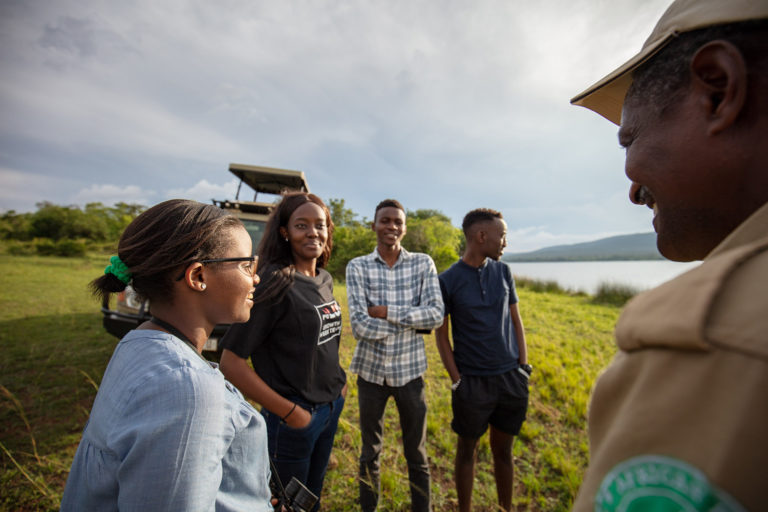
School of Wildlife Conservation students in the field. Photo courtesy of ALU
Mongabay: You’re not a conservationist by background. Why did ALU decide to create a School for Wildlife Conservation?
Fred Swaniker: I am not a conservationist in the traditional sense. I see Africa’s wildlife as a great African asset that we alone possess. But unless we mainstream conservation it will always exist in the shadows. For far too long, conservation has been the bastion of biologists. ecologists and mission-driven billionaires. It is time for leaders of all stripes to embrace conservation and that we bring leaders into the conservation fold with the non-scientific expertise, imagination, influence and political will to move conservation from the shadows into the spotlight.
From the start, the mission of African Leadership University (ALU) was to develop leaders with a purpose — not just leaders for the sake of leaders. My vision was to empower a new generation of transformational leaders to unlock a new era of opportunity and prosperity for Africa. That’s why we structured ALU around Africa’s seven grand challenges and opportunities. We prepare young leaders to be problem solvers and opportunity creators in these seven areas. Among the most urgent of these seven opportunities is wildlife conservation — which is why we established ALU’s School of Wildlife Conservation.
Mongabay: What are the biggest things that you think need to change in African conservation?
Fred Swaniker: We need to challenge the idea that Africa’s extraordinary biodiversity and wildlife is a diminishing resource that needs to be protected and reframe conservation as a growth sector — or “Environmental Investing” as I call it.
Growth sectors — whether they be technology, healthcare or energy — share three characteristics:
- First, they have an enabling environment, policies and leadership that prioritize an industry’s growth. We must create the same enabling conditions for environmental investing that recast our wildlife as one of our continent’s greatest assets.
- The second distinguishing characteristic of a growth sector is the magnetic appeal it has for young and bright talent. With the youngest workforce in the world, Africa has the opportunity to make environmental investing as sexy for today’s emerging talent as tech was for the last generation.
- The third and final defining characteristic of a growth sector is that they make lots of money. In addition to demonstrating healthy returns for investors, environmental investing must demonstrate it will produce dividends for local communities in the form of well-paying job jobs and meaningful tax revenue.
This is why we’ve made environmental investing the central conversation at the 2019 ALU Business Conservation Conference in Kigali on September 8-9. We’ll be assembling the conservation sector’s most influential policymakers, thought leaders, business executives, philanthropists and innovators to discuss how we turn conservation into a growth industry for Africa — and in doing so, transform our scarce wildlife and habitats into a vast abundance.
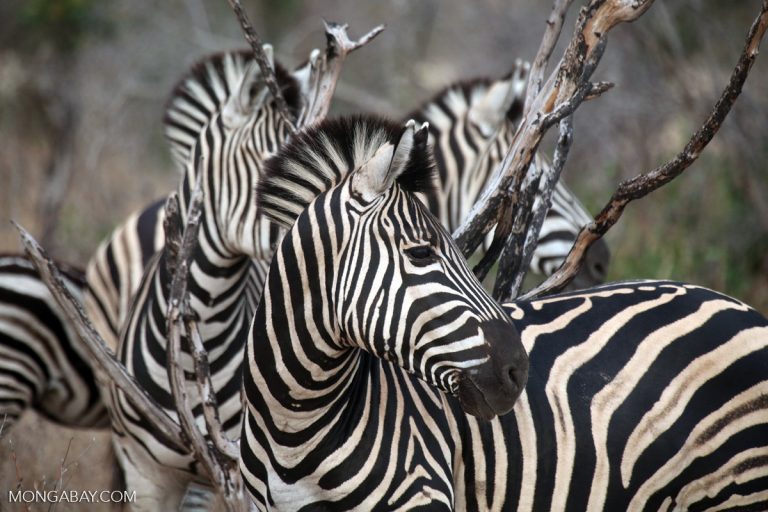
Common zebra (Equus quagga) in South Africa. Photo by Rhett A. Butler for Mongabay.
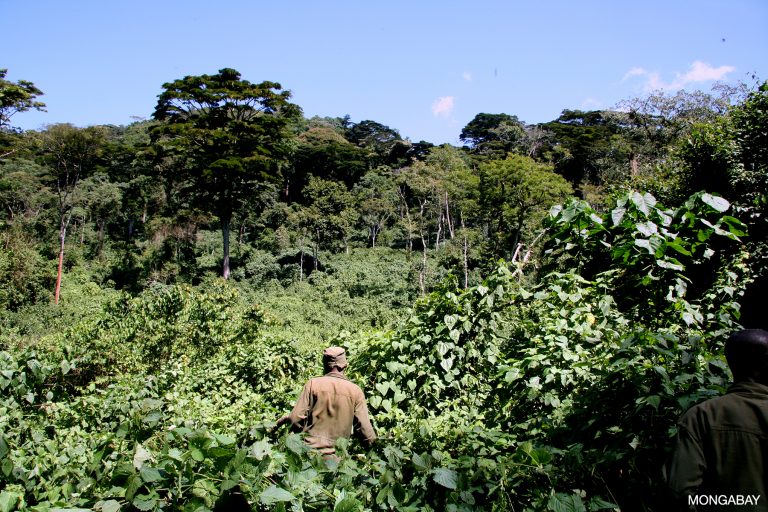
Rangers in Bwindi Impenetrable National Park, Uganda. Gorilla tourism in Uganda, Rwanda, and Democratic Republic of Congo generates millions of dollars a year for hotels, guides, and local industries as well as conservation. Photo for Mongabay.com by Rhett A. Butler.
Mongabay: What do conservationists need to do to make wildlife and biodiversity relevant for African communities, societies, and governments?
Fred Swaniker: It is already relevant — most Africans just don’t know it. They have been living with wildlife for thousands of generations ‑ it is only in this century that we are seeing negative effects.
People, governments, NGOs and tourism all tend to work in silos and in specific areas. The scope needs to be larger and partnerships need to be forged to create meaningful plans and processes that have investment from all these players and whose outcomes benefit all populations — rural and urban.
Most importantly, Africans need to feel a sense of ownership. They need to care. But they will only care if they share in the benefits. For example, members of a community who reside next to a habitat that is awarded carbon credits for protecting the forest need to experience for themselves the job creation and higher incomes that accompany these endeavors — and the earlier in life they are exposed to these benefits the more they will feel they have a stake in the game.
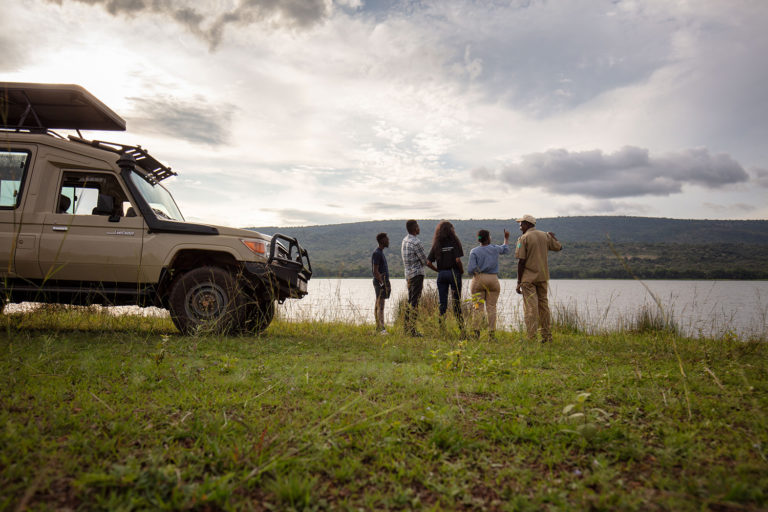
Field trip organized under ALU’s School of Wildlife Conservation. Photo courtesy of ALU
Mongabay: What new skills and approaches do young Africans need to be successful in conservation? How does ALU develop those skills and abilities?
Fred Swaniker: The skills are there and the talent is there. Like in so many other sectors of African life, what’s desperately missing is leadership. The role of ALU and our leadership accelerator ALX is to equip our students with the leadership skills, resources, and, most importantly, the entrepreneurial mindset to develop more holistic wildlife ventures in their countries and communities.
To transform conservation into the growth industry described above, a new “stakeholder management” mindset is required. A new generation of leaders with the dexterity to engage a complex and often competing ecosystem of stakeholders is essential. From NGOs, politicians, and poachers to conservationists, community leaders, and media, this new era of stakeholder managers must not only understand the science of conservation but also have the political sensibility and entrepreneurial leadership to transform a generations-old social cause into a next-generation high-growth market.
Africa is a big and diverse place, and there is no one solution for the whole continent. Which is why we are on this mission to prepare and galvanize the three million leaders who will be the headlights on the road ahead and the conservation changemakers across Africa in the years ahead.
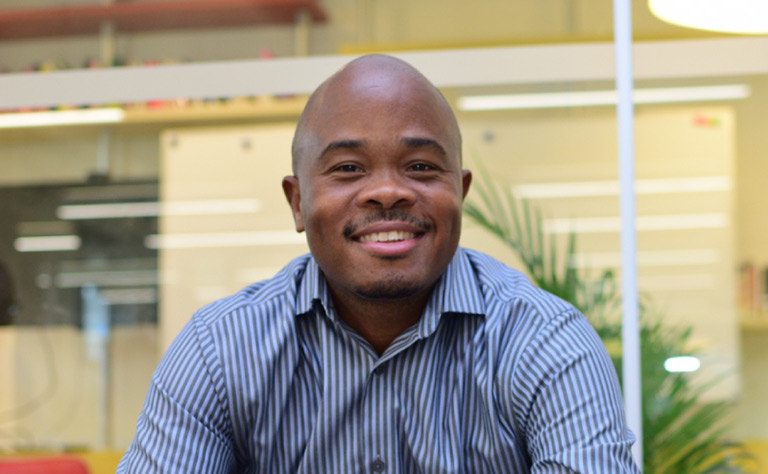
Fred Swaniker. Photo courtesy of ALU
https://news.mongabay.com/2019/09/trans ... 3-77211477


